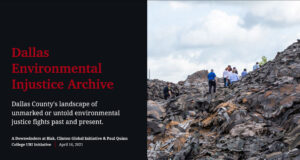Uncategorized
Downwinder Marsha Jackson
Downwinder Amanda Poland
Downwinder Evelyn Mayo
Downwinder Amber Wang
Downwinder Michelle McAdam
Downwinder Satavia Walker
Meet Downwider Cindy Hua
“Forward Dallas” Goes Backwards on Environmental Justice

In many ways the inaugural Forward Dallas “neighborhood summit” on Saturday was a microcosm of the current state of affairs at Dallas City Hall when it comes to Environmental Justice.
For the first three-quarters of the City’s presentation, staff used all the right language in explaining the goals of the once-a-decade, re-imagine-your-neighborhood, citywide land use planning exercise to the approximately 120 registered participants. Primary among them of course was “Equity” – City Hall’s reflexive one-word description of anything it does now days.

But there was also acknowledgement by Interim Director of Planning Julia Ryan that “previous racial inequities” had been ignored and needed to be redressed. Might there be some newfound ambition in this map redrawing to take on the baked-in racist zoning that’s made Southern Dallas the city’s dumping ground?
As it turns out, no. Dallas City Hall still thinks those “previous racial inequities” can be redressed by planting more trees. Honest.
During the last 30 minutes of the “summit,” participants were disbursed to three Zoom “breakout rooms,” one of which promised to focus on the environmental impacts of land use planning.
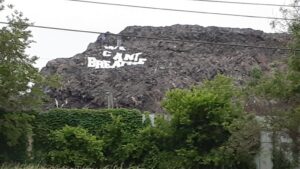
According to the City of Dallas Plan Department, this was all in your imagination.
If you’ve lived in Dallas the last four years, the Dallas where a six-story illegal “mountain” of shingles has become a national environmental justice symbol, the Dallas where Joppa and other Southern Dallas neighborhoods are constantly fighting off new batch plants, the Dallas that hosts an ancient polluter in West Dallas that appears to be openly flaunting the law. If you lived in this Dallas you might have expected this breakout presentation to include a section, if not base the entire session around, the idea of how to get rid of these kind of “previous racial inequities” that put people dangerously close to industrial polluters.
But City Hall lives in a different Dallas. At least according to this breakout session. One where the most pressing Environmental Justice issues revolve around better water management and planting more trees. According to staff, “heat islands” is THE EJ priority for Southern Dallas.
There was not a single mention of Shingle Mountain, Joppa, or West Dallas. In fact, there was no mention of Dallas’ industrial pollution problems at all. Not a one.
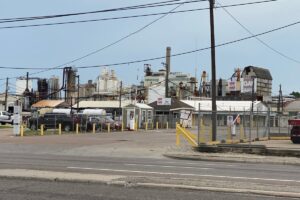 We can’t remember one recent public protest aimed at eliminating heat islands south of the Trinity River. There’s no shortage of trees in Joppa and Floral Farms. Indeed, it’s the City of Dallas lax code enforcement and on-going encouragement of industrial polluters that put the magnificent woods in those neighborhoods at risk.
We can’t remember one recent public protest aimed at eliminating heat islands south of the Trinity River. There’s no shortage of trees in Joppa and Floral Farms. Indeed, it’s the City of Dallas lax code enforcement and on-going encouragement of industrial polluters that put the magnificent woods in those neighborhoods at risk.
On the other hand, since 2018 there have been countless protests, posts, and articles about the problems caused by the City’s continuing embrace of racist zoning, meant to corral “undesirable” people and dirty industries along the Trinity floodplain. Saturday’s session pretended those never happened.
Why? Because City Hall keeps intentionally substituting “Sustainability” for “Environmental Justice.” The two terms aren’t synonymous, though staff uses them as if they were. Sustainability is a catch-all term usually paired, as it was on Saturday, with traditional conservation concerns like water management and urban forestry. A lot of mainstream green groups use it to update those concerns in light of the Climate Crisis. Nothing wrong with that. But it isn’t on point when it comes to the urgency of vastly unequal pollution exposure burdens currently suffered by Black and Brown residents.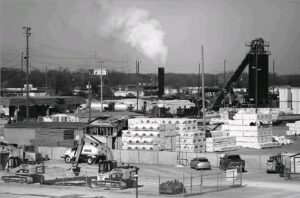
Environmental Justice is inherently about those unequal pollution burdens, they’re not tangential to any other goals. And driving those unequal pollution burdens in Dallas is racist zoning that puts the most polluting industries in predominately Black and Brown neighborhoods. To host a session on the environmental impacts of land use planning and not mention this fact even once is like holding a symposium on the Afghanistan War and never mentioning 9/11.
When this absence was noted in the Question and Answer part of the breakout session, staff were quick to assert how “really important” and “extremely important” the topic of “buffer zones and those kinds of thing” were to them and the process.
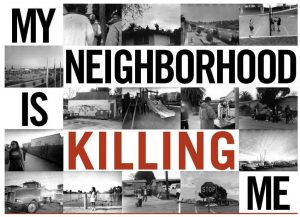 So important they never talked about it until they were forced to. This is a very bad sign.
So important they never talked about it until they were forced to. This is a very bad sign.
Staff didn’t even have the courage to quote the specific charge given to the Forward Dallas process by the much ballyhooed Climate Plan. There it is, listed as goal #4 under Air Quality:
The City will review and potentially amend its zoning standards to separate residential and industrial uses. In addition, it may also consider buffer zones between industrial uses and residential or recreational areas to protect residents from harmful emissions and hazardous industrial activities. The City should evaluate the appropriate buffer distances for air quality and industry types.
Every other air quality goal from the CECAP, including ones with a lot less overlap with land use, were reviewed. This one, directly on point, was ignored.
The most generous interpretation is that the Planning staff may want to sincerely try to resolve EJ issues but feel they lack the expertise, and default to relying on OEQS (Office of Environmental Quality and Sustainability) (¯\_(ツ)_/¯). This is an even worse sign.
Despite neighborhood opposition, OEQS has given its OK to every batch plant recently proposed for Southern Dallas, paid more attention to water run-off issues than human health effects at Shingle Mountain, and refused air monitoring requests from Joppa residents. OEQS has no one on staff with public health expertise or experience. It has been part of the problem Forward Dallas is supposed to be solving.
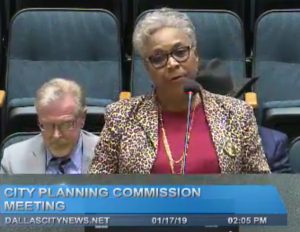
Marsha Jackson fighting off batch plants recommended by the OEQS.
When this was pointed out in the Q&A, OEQS staffer Suzanne Alvarez defended her own and her peers’ experience with “environmental remediation.” Remediation is the term regulators use for cleaning-up environmental problems after the fact, and is usually applied to soil and water contamination. It has nothing to do with measuring or anticipating human health harms from land use based on a public health perspective.
Alvarez’ own degree is in Civil Engineering and includes no public or environmental education at all. She’s not alone. OEQS is heavy on engineers and absent of any public health expertise. So the Department’s answer to every problem is also engineering heavy and absent any public health insight except to say whether a specific monitor is meeting federal standards or not. You’ll never get a comprehensive or honest Environmental Justice evaluation or prescription from such a group. The failure is baked-in.
This is why it’s a fatal mistake to let OEQS take the lead on this subject within Forward Dallas. If you want to change the Status Quo, you have to have someone other than the folks in charge of the Status Quo to do it.
One of the best examples of a public health perspective being integrated into local government policy in Texas is in Houston.
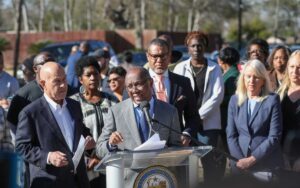
Dr. Loren Hopkins (fourth from right) is a City of Houston employee dedicated to environmental health.
Dr. Loren Hopkins is the Chief Environmental Science Officer for the Houston Health Department. Dr. Hopkins has served on the U.S. EPA Science Advisory Board and Risk and Technology Review Methods Panel and been a visiting scientist on the Centers for Disease Control and Prevention (CDC) Air Pollution and Respiratory Health Branch, Division of Environmental Hazards and Health Effects, National Center for Environmental Health in Atlanta, Georgia. Since 1998, she’s conducted research on the human health effects of Houston’s air pollution.
Rather than a purely reactive mode, Dr. Hopkins has been a proactive environmental health and justice advocate. Here’s an excerpt from a Houston Chronicle article about a neighborhood batch plant fight:
“Echoing the community’s health concerns about the fine particulate pollution emitted by concrete batch plants, the City of Houston’s Chief Environmental Science Officer, Dr. Loren Hopkins, shared data showing that the Acres Homes community already suffers six times the rate of ambulance-treated asthma attacks and twice the rate of cardiac arrests compared to the rest of Houston. Those health impacts are directly associated with exposure to fine particulate pollution, which is compounded by the multiple concrete batch plants already existing in Acres Homes.”
Can you imagine any staffer from the OEQS saying the same thing about a batch plant in Southern Dallas? Houston has public health advocates who oppose new polluters in communities of Color. Dallas has engineers who approve them.
If Planning staff really want to use the Forward Dallas process to tackle the systematic environmental justice issues driving so much grassroots discontent in the city, it needs to rely more on public health professionals like Dr. Hopkins and less on the engineers at OEQS.
Earth Day 2021: Our New Archive of Local Frontline Environmental Justice Fights
It’s Earth Day 2021. Board members Cindy Hua and Evelyn Mayo built this great archival tool to explore the history of EJ frontline fights in Dallas County. Click the image to start looking around.
Expect updates that expand its reach in the coming months. To contribute to our Frontline Fund to support Community Organizing to fight current frontline fights, click here.
Current Dallas City Council Members Failed History in 2020. They Don’t Deserve Your Support in 2021
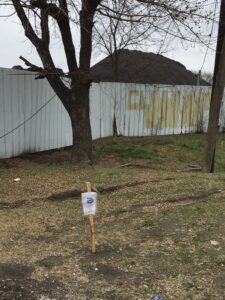
The response didn’t match the crisis. City of Dallas citation notice outside Shingle Mountain in 2019.
For almost two continuous decades Dallas residents had a string of thoughtful, sincere, and righteously-angry advocates who served on their City Council.
As Mayor, Laura Miller just about single-handedly stopped over a dozen new coal plants from being built by Rick Perry and implemented the region’s first Green Procurement ordinance. As a council member, Angela Hunt hunted down waste, corruption, and Staff shenanigans. If she couldn’t get her peers to pay attention, she made sure a reporter did. Scott Griggs and Philip Kingston, then Mark Clayton followed suit. They defeated the zombie Trinity Toll Road AND gas drilling – the latter being “a done deal” according to then-Mayor Rawlings.
Sometimes they fought their council opponents directly. Sometimes they made sure documents that were never supposed to see the light of day got their own spotlight. You knew these partisans would find a way to advance the cause. Because that cause was why they wanted to serve.
But when Griggs couldn’t overcome the cynical Mayoral bid of Eric Johnson, and Kingston’s bad boy behavior cost him his Council seat, the horseshoe lost its last devoted grassroots insurgency. As a result, the current Dallas City Council is the least progressive in deed, if not in rhetoric, since 2002.
Who among the present 15 members could a City Hall observer nominate as the rightful heir of any of those past True Believers? Not a one.
Residents have no confidence that current council members would put ANY cause, no matter how righteous, before their own political ambitions. That’s not a prediction. 2020 provided the proof.
There were exactly two urgent historic crises that brought nationwide attention to Dallas city government last year: Police response to the George Floyd protests, and Shingle Mountain. This Council failed to meet both with integrity.
POLICE ABUSE AND REFORM
Even after the loss of eyes and other serious physical harm inflicted by a Dallas Police Department that was out of control during the May and June protests, not a single Council Member called for the Police Chief to resign. Not a one.
It took the former Chief being caught in a lie regarding that excessive force months after the fact that led to her departure. There were no brave stances from Council Members. Not a one.

Even after Dallas’ youth and People of Color organized well-attended and persistent protests before and during the budget process to win re-prioritization of police funding, not a single City Council member proposed a budget that reflected their demands. Not a one.
We’ll leave it to the long-time advocates of that cause who are now council candidates, including Changa Higgins, running to replace Adam Bazaldua in District 7, to explain how badly the Council failed to meet the moment. But there’s no question that when a large segment of Dallas residents wanted something done about the use of force and the redeployment of resources away from the Police Department, they had absolutely no champion on the current City Council. Not a one.
What are the consequences to those elected officials for their inaction? For most Dallas “progressive” groups making endorsements on the Council Races, there aren’t any. Not a one.
SHINGLE MOUNTAIN
The entire Council also turned their backs on Marsha Jackson and her neighbors while Choate Street residents suffered daily health problems caused by the City’s most high-profile example of Southern Dallas negligence, Shingle Mountain.
During the 2019 election, 10 current city council members – Chad West, Adam Medrano, Carolyn Kind Arnold, Jaime Resendez, Omar Narvaez, Adam Bazaldua, Tennell Atkins, Paula Blackmon, Cara Mendelsohn, David Blewett – said they’d work to re-establish the Environmental Health Commission if they got elected. Not a single City Council member made a motion to do so when Jackson and her allies asked them to follow through on their commitments last April. Not a one.
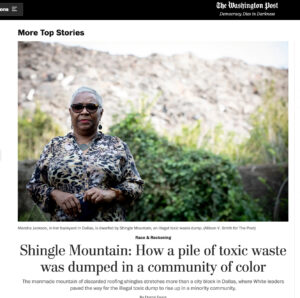
Not a single council member has ever apologized to Jackson. There were no leaking of documents that would have shown just how much the city’s silly demand for some kind of cash payment from the landowners needlessly delayed the clean-up at the dump for over a year. No push back to staff’s irrational claims about why they couldn’t have used the illegal status of the dump to enter the property at any time after it opened and begin a clean-up. Jackson could not count on a single current city council member to be her advocate. Not a one.
While nobody was expecting North Dallas members to take up these causes, there were supposed to be “Progressive” city council members that would carry on the work of Hunt/Griggs/Kingston. Turns out, not so much.
The best that can be said about Chad West is that he’s no Scott Griggs. Adam Medrano seemed to be coasting on his way to terming out. Casey Thomas was never part of that crowd and neither was Carolyn Arnold. Nobody expected much from Jamie Resendez in his first term and he delivered. Paula Blackmon? She was the Mayor Rawlings PR aide when he was calling gas drilling in Dallas a done deal and those Real Progressives were fighting both of them.
But by far the steepest falls from expectations to performance were Omar Narvaez and Adam Bazaldua.
DISTRICT 6

CM Navarez knows the names of every character in the Star Wars universe, but couldn’t name any children suffering under Shingle Mountain.
Almost two years into the job and Council Member Narvaez still tells everyone that will listen that he never expected to be the Chair of the Council’s Environmental Committee and didn’t know that much about environmental issues. His real passion was for housing, but for some reason, the Mayor gave him responsibility for the Environmental Committee, and the shepherding of the City’s precious Climate Plan.
Maybe because of his lack of familiarity with the subject matter, or maybe because it was made clear by the Mayor and Staff that his job would be exclusively about getting the city’s climate plan passed but he froze like a deer in headlights when Marsha Jackson needed him most.
He refused to consider adding the re-establishment of the Dallas Environmental Health Commission to the Climate Plan ordinance despite Ms. Jackson’s personal pleas that she and other residents needed a forum that took these problems seriously.
He kept using the old “it’s in litigation” dodge in public to avoid answering any questions about Shingle Mountain even though city officials routinely discussed it when it suited their PR agenda.
He never met with Ms. Jackson, inquired about her health, toured the mostly Latino neighborhood or asked what he could do as the Chair of the City’s Environmental and Sustainability Committee to relieve their suffering. He never offered to lobby for more air monitoring or health protections. He never offered to do anything.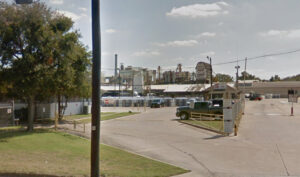
Despite his district hosting the region’s largest asphalt shingle factory (and Sulfur Dioxide polluter), GAF, whose products filled the 6-story Shingle Mountain dump, the Chair of the City’s Environmental and Sustainability Committee never discussed this environmental justice connection between POC neighborhoods in Dallas.
Despite two well-researched published reports identifying vast inequities in the way the City enforces Code in Southern Dallas and how its air pollution burdens are distributed, the Chair of the City’s Environmental and Sustainability Committee held no hearings or meetings related to these environmental justice issues during the last 18 months. Not a one.
Despite national media coverage of the City’s inept handling of Shingle Mountain, and the city’s poor environmental justice record, including articles in the Washington Post and Philadelphia Tribune, and a hour-long documentary on BET, the Chair of the City’s Environmental and Sustainability Committee held no hearings or meetings related to how to avoid another Shingle Mountain during the last 18 months. Not a one.
Despite never holding any meetings devoted to environmental justice the Chair of the City’s Environmental and Sustainability Committee did find an urgent need to convene a special task force to examine and come back with solutions to the pressing issue of Oncor’s cutting down 5 acres of trees near White Rock Lake. Replacing trees in North Dallas, not reducing human suffering in Southern Dallas, was the priority of a council member representing an overwhelmingly POC district, which also happens to the the birthplace of the modern Environmental Justice movement in Dallas.
And of course, the majority of his Committee Chairmanship was spent making sure Staff got its way with the passage of the city’s “North Dallas” Climate Plan, of which many dollars in potential grants depends, if not actual changes on the ground. The plan does zero to address problems like Shingle Mountain and GAF, does nothing for Narvaez’ district, but is very, very concerned about stormwater management and tree cover.
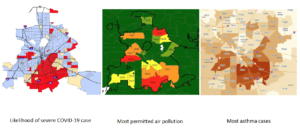
Throughout the entirety of the Shingle Mountain crisis, CM Narvaez was a good soldier for the Mayor and Staff. Which made him an awful Chair of the Environmental Committee for Southern Dallas residents during the most serious environmental justice controversy in the last 25 years.
Not content to just do no good in that case, Narvaez has gone out of his way to praise and campaign with District 8 Council Member Tennell Atkins, a primary architect of Shingle Mountain. In doing so, he fuels Atkins’ mind-blowing Big Lie that he was the facilitator of a clean-up instead of a major obstacle. Atkins is among the most unconscionable right-wing members on the Council but Narvaez treats him like a conquering hero, rubbing salt into Marsha Jackson’s wounds with every unsolicited and unearned act of praise.
Was it embarrassment over this performance this last year that kept Narvaez from granting an interview with Soledad O’Brien for her BET documentary? Instead, the Chair of the City’s Environmental and Sustainability Committee let Atkins alone represent the City on the record.
And he’s followed Staff’s lead right over the cliff on other important environmental health issues too. This might be hard for his Progressive admirers to believe, but he actually bragged about Joppa getting an unprecedented TCEQ air monitor when in fact it’s located three miles north in Bonton.
Then he made that lie worse by claiming that this TCEQ monitor’s location – miles away from industrial sources of pollution in Joppa – could more accurately show what the air was like there than if it had been put in Joppa itself.
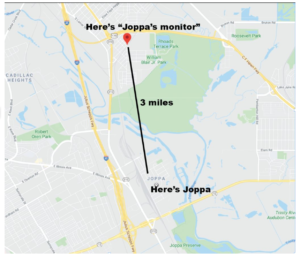 You read that right. According to the Chair of the City’s Environmental and Sustainability Committee, air monitors three miles away from Joppa more accurately reflect the air Joppa residents are breathing than monitors right outside their front doors.
You read that right. According to the Chair of the City’s Environmental and Sustainability Committee, air monitors three miles away from Joppa more accurately reflect the air Joppa residents are breathing than monitors right outside their front doors.
Does CM Narvaez really believe this, or is he just parroting Staff’s opposition to local air monitoring? Which interpretation is more damning?
And what’s his inevitable pretzel logical response to finding out that his own District’s residents are embracing local neighborhood monitoring? Will he be advocating those “local” West Dallas monitors to be located three miles north, in Irving, to get a “truer picture” of West Dallas pollution burdens?
The cynicism is strong in this one.
CM Narvaez should have been the Chair of Housing, not the Environmental Committee. As the latter, he’s set the cause of environmental justice back years. Despite being an over-the-top Star Wars geek, when the time came to make his own choice in his own movie, he went over to the Dark Side.
DISTRICT 7

Despite appearances, CM Bazaldua is neither Jewish or an environmentalist.
CM Adam Bazaldua has disappointed in a slightly lower profile, albeit more personal way.
Bazaldua represents District 7, home to the Freedman’s town of Joppa, and per capita, Dallas’ most polluted neighborhood.
In Joppa sits TAMKO, the other large asphalt shingle factory that operates in a Dallas POC neighborhood. Shingle Mountain is literally right down Central Highway from Joppa, and TAMKO. You can routinely smell its asphalt cooking at all times of day. Along with GAF, it was TAMKO’s products you saw most often being dumped at Shingle Mountain.
But Bazaldua, like Navarez, never brought up that toxic connection that binds his constituents to Choate Street residents. Not once.
In fact, you’d be hard pressed to find anything related to environmental justice concerns uttered by Bazaldua once he took office despite Joppa being a battle ground for such concerns for at least the past three years. He’s conspicuously avoided any mention on it in his campaign material. You’d never know his district was bothered by any pollution problems at all.
When Staff, and CM Navarez told the public there was a new monitor in Joppa that was really in Bonton, he didn’t disagree. He went along with the charade. He didn’t demand overdue air monitoring for a community whose residents had been asking for it since at least 2018.
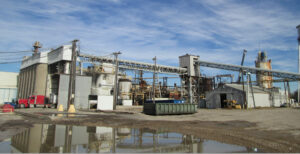 There was no effort by the Council Member to join residents in opposing the Joppa-based Austin Asphalt batch plant permit renewal, even after it was learned that the plant’s air modeling hadn’t been revised from its original sparse West Texas location to reflect its new dense urban Dallas spot.
There was no effort by the Council Member to join residents in opposing the Joppa-based Austin Asphalt batch plant permit renewal, even after it was learned that the plant’s air modeling hadn’t been revised from its original sparse West Texas location to reflect its new dense urban Dallas spot.
There was no call for locomotive electrification in the Joppa switch yard, and in fact two more tracks were laid down that can only result in more carcinogenic black soot from more diesel engines in more locomotives.
Most disheartening however, was the fundamental error in elected official protocol Bazaldua committed last year when Marsha Jackson turned to him in desperation to intervene and advocate for the Dallas Environmental Health Commission on the eve of the Climate Plan vote.
Jackson asked him to look at the language in the proposal she and her Southern Sector Rising allies had 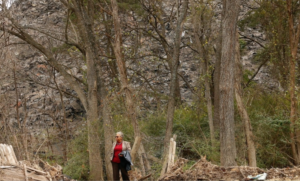 submitted to him. She asked him to take it to Chairman Navarez and make the case for what both had pledged to do less than a year earlier. And then she asked hm to please let her know the results of that discussion before the Council voted on the Climate Plan. He told her he would do so.
submitted to him. She asked him to take it to Chairman Navarez and make the case for what both had pledged to do less than a year earlier. And then she asked hm to please let her know the results of that discussion before the Council voted on the Climate Plan. He told her he would do so.
He didn’t.
When a 61-year old woman being buried daily under tons of waste that the City helped put there comes to you and asks you to plead her case to another Council Member in private and you not only never even read her proposed language, you never bother to even call her back – it is not acceptable behavior from any kind of Council Member, much less one that is described as “progressive.” And no, he never apologized.
What are the consequences to the Council for their collective snub to Marsha Jackson? For most Dallas “progressive” groups making endorsements on the Council Races, there aren’t any. Not a one.
NOT DESERVING
Maybe you think this criticism is all too-narrow. Too specific. It doesn’t account for all the “good things” accomplished by these “progressive” city council members that balance out these woeful absences of empathy and courage. It’s too much to punish them all for losing their way on just these two issues.
But those “good things” were not hard sells, they didn’t require risk-taking. Here’s an exercise: name one issue the Progressives on this risk-averse Council have put themselves, their positions as elected officials on the line for. We’ll wait.
Maybe you weren’t seriously injured by Dallas police in a protest. Your house probably doesn’t back up to 140,000 tons of illegal hazardous waste.
 But maybe next week, next month, or next year you will be in a similar situation. Through no fault of your own you’ll need a Council Member to intervene on your behalf. But if it conflicts with the Staff’s agenda, or makes the Council Member go out on limb, you might be disappointed.
But maybe next week, next month, or next year you will be in a similar situation. Through no fault of your own you’ll need a Council Member to intervene on your behalf. But if it conflicts with the Staff’s agenda, or makes the Council Member go out on limb, you might be disappointed.
If the Council won’t take on the Police when they put out eyes, or polluters when they dump illegally by the truckload, what are the odds your cause will rate action?
That’s the point. Just like all of us, a Council Member shows their true selves in times of crisis, not when the going is easy. In 2020 there were two times history called, and not a single Dallas Council Member answered the phone. Not a one.
What other way can Dallas “Progressives” proclaim these things matter other than using the blunt language of the ballot box and refuse to vote for them? There aren’t any. Not a one.

